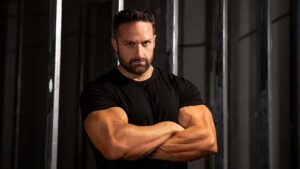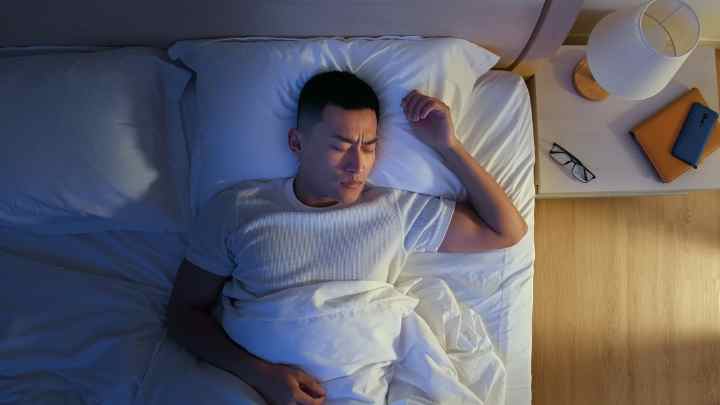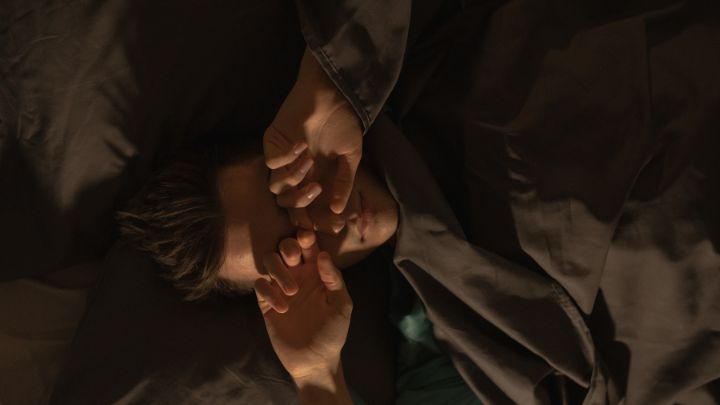For decades, the narrative of sleep research has been predominantly shaped by its quantity and quality. But, a growing body of evidence suggests we’ve been only scratching the surface.
The timing of our sleep, known as the sleep chronology, and the consistency of our sleep patterns, referred to as sleep regularity, are crucial but often overlooked aspects of sleep health.
In a nutshell, having a regular sleep routine might one of the most important habits one should have to boost one’s longevity.
FREE anti-ageing guide

- Master the science of rejuvenation.
- Apply proven tips to turn back the clock.
- Transform your health with top longevity specialists.
In today’s blog at Avea, we are sharing the top 10 sleeping habits of Bryan Johnson. His sleep routine has piqued the curiosity of many, especially following his revelation on social media of achieving an 8 months-long streak of perfect sleep scores using the WHOOP wearable device.
So, shall we see what we’ve been doing wrong? Luckily, it’s not related to earning $2 million a year.
Sleep is the best meditation.
Dalai Lama
It’s a good idea to keep this list where you’ll see it often. So, stick it on your bathroom mirror or bedroom wall, and give yourself a star for each day you stick to the plan.
When you hit level 10, even Bryan will admit that you’ve mastered the art of sleeping like a PRO!
1. Identify yourself as a professional sleeper
The first step is to think of yourself as a professional sleeper. Right now, the popular belief is that you don’t need much sleep, and it’s somehow a sign of weakness to prioritise it.
You’ve probably heard, “Money never sleeps, pal.” from the Wall Street film. Ignore that. It’s smarter to put sleep at the top of your list. You’ll not only feel and look better, but life in general will seem a lot smoother.
Understand the importance of sleep: insights from sleep expert, Dr. Matthew Walker.
2. Get a consistent bedtime
Setting a consistent bedtime is crucial because it signals to your body that it’s sleep time at the same moment every day.
This might mean adjusting your daily routine, like having dinner earlier or scheduling your evening plans sooner.
Treat it as the most critical appointment of your day. Just as you’d apologise for being even five minutes late to work or a meeting with friends, don’t let yourself down by missing your bedtime.
In Bryan’s household, when it’s time to sleep, Tage (his son) and him, immediately drop everything and head to bed.
‘’It’s a bit of a joke between us, but it underscores our mutual respect for sleep. It’s our way of acknowledging that good sleep makes us better towards each other’’, he says.
Bryan has picked 8:30 PM as his bedtime because he treasures the quietness of the early morning, having a few hours to himself before the world wakes up.
But your routine is yours to shape. If you’re more of a night person, that’s perfectly fine. The key is to select a bedtime that suits you and stick to it with dedication.
Ibrahim reverses bioage by 6.5 years with Avea

- Uncover how Ibrahim turned back the clock.
- Learn the secrets of cellular health.
- Start your own age-defying routine today.
3. Create a wind-down routine
The 3rd step is developing a wind-down routine. Bryan has learned from his own experience that going to bed with a mind full of the day’s issues means those thoughts will buzz around all night.
To combat this, he starts his sleep routine 30 to 60 minutes before bed. Whenever worries or plans try to sneak into his thoughts, he mentally switches to “sleep mode,” acknowledging the thought before gently setting it aside.
He suggests finding a calming pre-sleep ritual, like reading, taking a leisurely walk, or engaging in a relaxing hobby.
The key is to steer clear of screens and any activities that might get your adrenaline pumping. Avoiding late-night disputes or solving complex problems can also help ease the transition into sleep.
4. Eat early
The 4th tip he offers is about eating early. After conducting numerous experiments with various foods and meal timings, he discovered his best sleep came from eating his last meal at 11:00 a.m.
Recognising that might seem unusually early for most, he emphasises it’s about giving your body time to digest before bedtime. This isn’t to say everyone should eat their last meal at 11:00 a.m., but rather to consider dining earlier and avoiding heavy meals late in the day, which can disrupt sleep. Give your body 3–4 hours to digest your food before going to bed.
During social gatherings, Bryan opts for lighter options, like steamed vegetables, to maintain social harmony without impacting his sleep routine. This approach helps him blend in socially without compromising his sleep hygiene.
5. Avoid stimulants
The 5th point he makes is quite straightforward: steer clear of stimulants or anything else that might interfere with your sleep.
This includes both alcohol and caffeine. He shares from his own experience that consuming alcohol later in the day drastically reduces his deep sleep by up to 80%, severely impacting his rest. Consequently, he’s cut out alcohol entirely.
As for caffeine, people break it down at different rates, but he’s chosen to eliminate it completely from his diet. This change has significantly improved his sleep quality.
Consider understanding how these substances might be affecting your own sleep, and start being cautious about what you consume and when.
Avea’s solution
To truly optimise your sleep, it’s important to focus on both your energy and relaxation cycles.
Integrating science-backed supplements like NMN and Glycine into your daily routine can support these goals.
NMN and NAD+ enhance cellular energy production, ensuring your body has the vitality it needs throughout the day. Glycine has been shown to promote relaxation and improve sleep quality in countless studies.
The Avea Complete Rejuvenation Routine combines powerful longevity ingredients, helping you achieve a balanced state, leading to more restful sleep and a rejuvenated feeling upon waking.
This bundle consists of a premium blend of ingredients, chosen for their potency, bioavailability and purity. Our science-driven formulas ensure synergistic benefits for optimal efficiency.
The best anti-ageing supplements

- Addresses signs of ageing comprehensively.
- Improves sleep quality.
- Boosts cellular renewal and energy.
- Enhances collagen production.
- Recommended by biohackers and health experts.
6. Avoid the bad light at night
The 6th step he follows is managing light exposure in the evening. He uses a computer app called Flux to filter out blue light from his screen. When watching movies with friends, he opts for blue light blocking glasses to minimise exposure.
At home, his room is set up with blackout curtains to ensure it’s completely dark, and while travelling, he uses a sleep mask. The goal here is to minimise any light that could disturb sleep. He emphasises the importance of reducing screen time before bed as a key strategy for better sleep hygiene.
7. Adjust the temperature
This habit is about keeping your sleeping environment at the perfect temperature. Of course, the ideal temperature can vary from person to person. The key point is that extremes of hot or cold can disrupt quality sleep.
Also, take into account the preferences of your partner or other household members. Bryan personally uses an Eight Sleep mattress to regulate his bed’s temperature—dropping it to 71 degrees Fahrenheit for deep sleep phases and raising it to 73 degrees for REM sleep.
He suggests adjusting your thermostat or air conditioning, trying out different bedding materials, and improving room ventilation to enhance your sleep environment.
8. Design the most peaceful environment
Create a peaceful sleep environment for you, for your family, for your children.
Now, I have three kids. If I could travel back in time, I would sit everyone down and say, We are a sleep family, and here are the rules of how we do sleep. We go to bed on time, we never get up at night, we never wake anyone up unless we feel like our life is being threatened.
Bryan Johnson
Establishing clear sleep guidelines, emphasising the importance of going to bed on time, minimising nighttime disruptions, and maintaining a quiet environment to support everyone’s sleep. Such practices, he believes, lay the foundation for lifelong healthy sleep habits.
Bryan also stresses the importance of using the bedroom solely for sleep. This means no reading, watching movies, or other activities in bed, reinforcing the association between the bedroom and sleep.
He suggests that for those who find it feasible, sleeping alone might be worth considering. Despite potential controversy, he points out that differing sleep patterns and habits between partners can lead to disturbances, and separate sleeping arrangements might actually improve sleep quality for both.
9. Catch the good light in the morning
Every morning, right when Bryan wakes up around 5 or 5:30 without an alarm, the first thing he does is, turn on a light that’s as bright as 10,000 Lux for a few minutes.
It’s his body’s signal that it’s time to start the day– like his own sun. This little ritual boosts his mood and energy, reinforcing his body’s natural wake-up and sleep times. He believes this consistency played a big part in him getting perfect sleep for eight months straight, as his body got really tuned into what to expect each day.
He mentions that if you’re not an early riser like him, that’s okay. Getting outside in natural sunlight works wonders too. He loves catching those early morning or late afternoon rays, avoiding the harsh sun from 10 a.m. to 4 p.m. to protect his skin. It’s all about soaking in that sunlight at the right times to keep your sleep-wake cycle in check.
10. Track yourself
The last step, number 10, is all about tracking your sleep, which Bryan admits could have been his top advice if it weren’t for the cost.
He’s found tracking sleep data to be incredibly valuable. It’s helped him understand what helps and what harms his sleep.
His go-to gadget is the WHOOP band, which keeps tabs on how much sleep he gets, the quality of that sleep, and his daily activity levels. Think of it as training for a race without a stopwatch; without measuring, you can’t really tell if you’re getting better or not.
Build your sleep routine now
Bryan Johnson’s insights into achieving optimal sleep serve as a beacon if you’re seeking to enhance your well-being.
By prioritising consistency, hygiene, latest science and technological innovation in his nightly routine, Johnson has not only achieved remarkable sleep scores but also demonstrated the profound impact of sleep on overall health and quality of life. He currently ranks 7th in the Rejuvenation Olympics.
Are you ready to boost your physical vitality, mental clarity, and emotional resilience?
It might start with creating your personalised sleeping routine.












